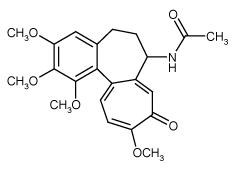Replaces Prod. #: BML-T118
Depolymerizes microtubules and inhibits tubulin polymerization. Induces apoptosis in a variety of cells.
Product Details
| Formula: | C22H25NO6 |
| |
| MW: | 399.4 |
| |
| Source: | Isolated from Colchicum autumnale. |
| |
| CAS: | 64-86-8 |
| |
| MI: | 14: 2471 |
| |
| RTECS: | GH0700000 |
| |
| Purity: | ≥94% (HPLC) |
| |
| Appearance: | White to off-white solid. |
| |
| Solubility: | Soluble in DMSO (14mg/ml), 100% ethanol (7mg/ml), water (7mg/ml) or dimethylformamide (12mg/ml). |
| |
| Shipping: | Ambient Temperature |
| |
| Long Term Storage: | +4°C |
| |
| Handling: | Protect from light and moisture. |
| |
| Regulatory Status: | RUO - Research Use Only |
| |
Please mouse over
Product Literature References
Attenuation of Colchicine Toxicity in Drug-resistant Cancer Cells by Co-treatment with Anti-malarial Drugs: A.R. Choi, et al.; Anticancer Res.
36, 5859 (2016),
Application(s): Cell treatment with KBV20C cells,
Abstract;
Full Text
Opposite rheological properties of neuronal microcompartments predict axonal vulnerability in brain injury: T. Grevesse, et al.; Sci. Rep.
5, 9475 (2015),
Application(s): Cell Culture,
Abstract;
Full Text
Update on colchicine and its mechanism of action: Y. Molad; Curr. Rheumatol. Rep.
4, 252 (2002),
Abstract;
Colchicine protects mice from the lethal effect of an agonistic anti- Fas antibody: G. Feng & N. Kaplowitz; J. Clin. Invest.
105, 329 (2000),
Abstract;
Cytochrome c release and caspase-3 activation during colchicine-induced apoptosis of cerebellar granule cells: A.M. Gorman, et al.; Eur. J. Neurosci.
11, 1067 (1999),
Abstract;
Sustained JNK activation induces endothelial apoptosis: studies with colchicine and shear stress: Y.L. Hu, et al.; Am. J. Physiol.
277, H1593 (1999),
Abstract;
General features of the recognition by tubulin of colchicine and related compounds: Y. Engelborghs; Eur. Biophys. J.
27, 437 (1998),
Abstract;
Antimitotic natural products and their interactions with tubulin: E. Hamel et al.; Med. Res. Rev.
16, 207 (1996),
Abstract;
Colchicine induces apoptosis in cerebellar granule cells: E. Bonfoco, et al.; Exp. Cell. Res.
218, 189 (1995),
Abstract;
Inhibition of drug-induced apoptosis by survival factors in PC12 cells: L. Lindenboim, et al.; J. Neurochem.
64, 1054 (1995),
Abstract;
Disruption of microtubules inhibits the stimulation of tissue plasminogen activator expression and promotes plasminogen activator inhibitor type 1 expression in human endothelial cells: L. Santell, et al.; Exp. Cell. Res.
201, 358 (1992),
Abstract;
The effects of microtubule disrupting drugs on the differentiation of HL-60 leukemia cells: M.F. Lueng & A.C. Sartorelli; Leuk. Res.
16, 929 (1992),
Abstract;
Rapid rate of tubulin dissociation from microtubules in the mitotic spindle in vivo measured by blocking polymerization with colchicine: E.D. Salmon, et al.; J. Cell. Biol.
99, 1066 (1984),
Abstract;
Proposed mechanism for colchicine poisoning of microtubules reassembled in vitro from Strongylocentrotus purpuratus sperm tail outer doublet tubulin: K.W. Farrell & L. Wilson; Biochemistry
19, 3048 (1980),
Abstract;
Kinetics and mechanism of colchicine binding to tubulin: evidence for ligand-induced conformational change: D.L. Garland; Biochemistry
17, 4266 (1978),
Abstract;
Fluorometric assay of tubulin-colchicine complex: T. Arai & T. Okuyama; Anal. Biochem.
69, 443 (1975),
Abstract;
A new colchicine binding assay for tubulin: P. Sherline, et al.; Anal. Biochem.
62, 400 (1974),
Abstract;












